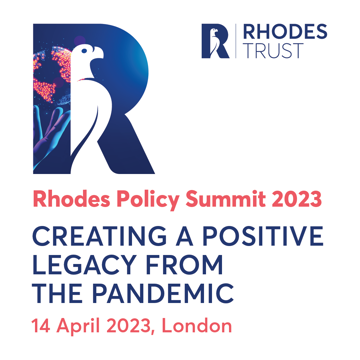Rhodes Policy Summit: Creating a Positive Legacy from the Pandemic

Description
Rhodes Policy Summit: Creating a Positive Legacy from the Pandemic
Breaking the cycle of panic to neglect with an Always On approach.
Friday 14 April 2023
Central London location in Covent Garden. Exact venue to be announced 48 hours before the event for security reasons.
ABOUT:
Join some of the most influential voices in global health to debate how we use the lessons of COVID-19 to bolster our defences against future pandemic threats. With public and political interest in preparedness at risk, the inaugural Rhodes Policy Summit will ask how can we ensure we have equitable and practical measures in place to prepare us for the next global health crisis.
The summit will bring together some of the world’s leading scientists, internationally influential political figures, business innovators, civil society representatives and thought leaders in global health.
The aim of the Summit is to set out an ‘Always On’ approach to pandemic preparedness: where global health architecture is developed that can be used for routine healthcare delivery and when responding to the next pandemic. This includes developing capacities for digital infrastructure, vaccination, surveillance and manufacturing that could pivot between use for pandemics and during peacetime.
CONFIRMED SPEAKERS INCLUDE:
- Tony Blair, Executive Chairman, the Tony Blair Institute for Global Change, and Former Prime Minister of Great Britain and Northern Ireland
- Dr David Agus, Founding Director and CEO of The Lawrence J. Ellison Institute for Transformative Medicine
- Hala Audi, CEO, UniZIMA
- Professor Sir John Bell, Immunologist and Regius Professor of Medicine, University of Oxford
- Professor George Fu Gao, Former Director, Chinese Center for Disease Control and Prevention
- Hannah Kettler, Director of Design and Operationalisation of COVAX, Gavi
- Dr Amadou Sall, CEO of Institut Pasteur, Senegal
- Professor Ngaire Woods, Dean of the Blavatnik School for Government, University of Oxford
THE LATEST PROGRAMME CAN BE FOUND HERE
REGISTRATION:
Please note that this event is invitation only. If you have any questions please contact conferences@rhodeshouse.ox.ac.uk.
• All invitations are non-transferable, and you must RSVP to gain admittance
• Government issued photographic ID must be brought with the invitation
• Entry is conditional on being prepared to be searched. Bringing of large bags, etc. is discouraged
After purchasing your ticket, you will be invited to register on our Forum event platform and app closer to the conference date.
CONTACT:
Please contact conferences@rhodeshouse.ox.ac.uk if you have any questions or have any difficulties booking.
Delegates are responsible for organising their own accommodation, but below are some suggestions close by to the venue. Book early to avoid disappointment!
High End: The Savoy, One Aldwych, ME London
Mid Range: Hilton London Waldorf, Strand Palace, Clermont Hotel Charing Cross
Budget: Travelodge Covent Garden, Hub by Premier Inn - Covent Garden
Dress Code: Business Casual - No Ties
We rely on the generosity of individual donors and other sponsors to cover the costs of this Forum. This particular event was made possible through the generous support of one of our donors. Your ticket includes lunch, refreshments and snacks throughout the day, plus a full day of conferencing.
ALT TEXT: Large 'R' on the left with an image of a hand with a globe on the finger with orange dots on it. In pink writing it says 'Rhodes Policy Summit 14 April 2023' and in blue writing it says 'Pandemic Preparedness'. The blue Rhodes Trust logo is situated at the bottom in the middle of the image

